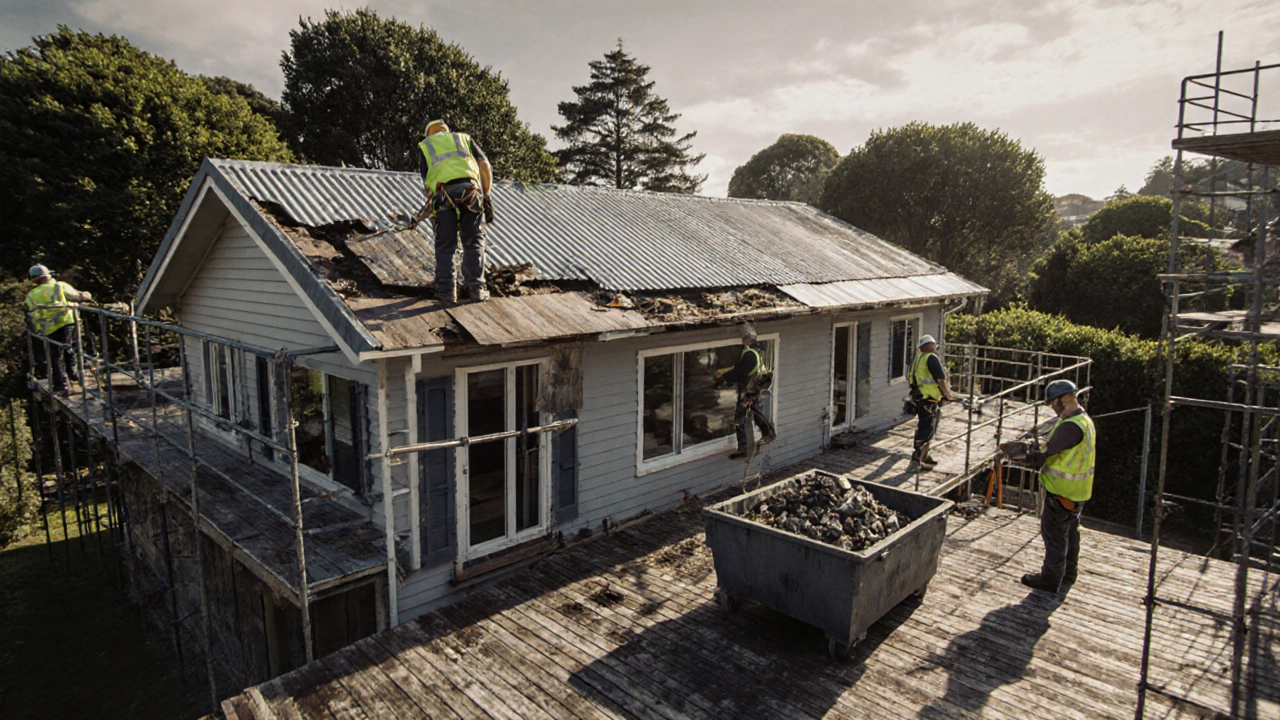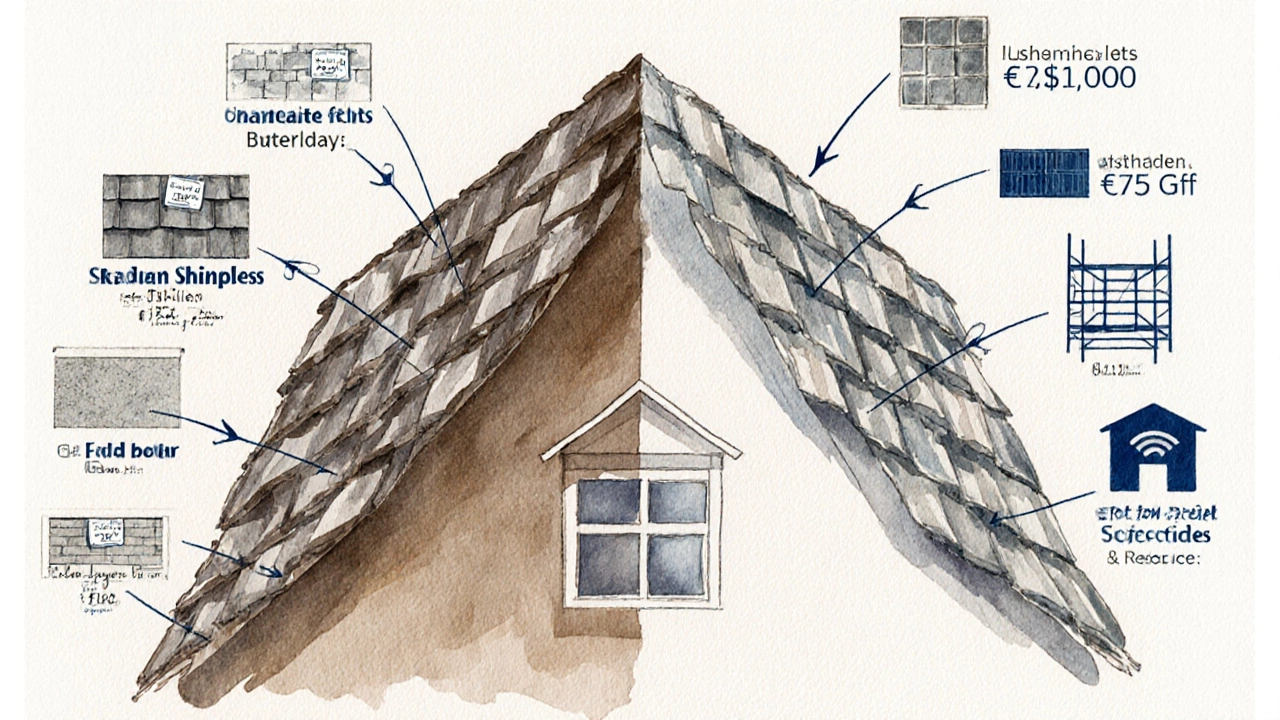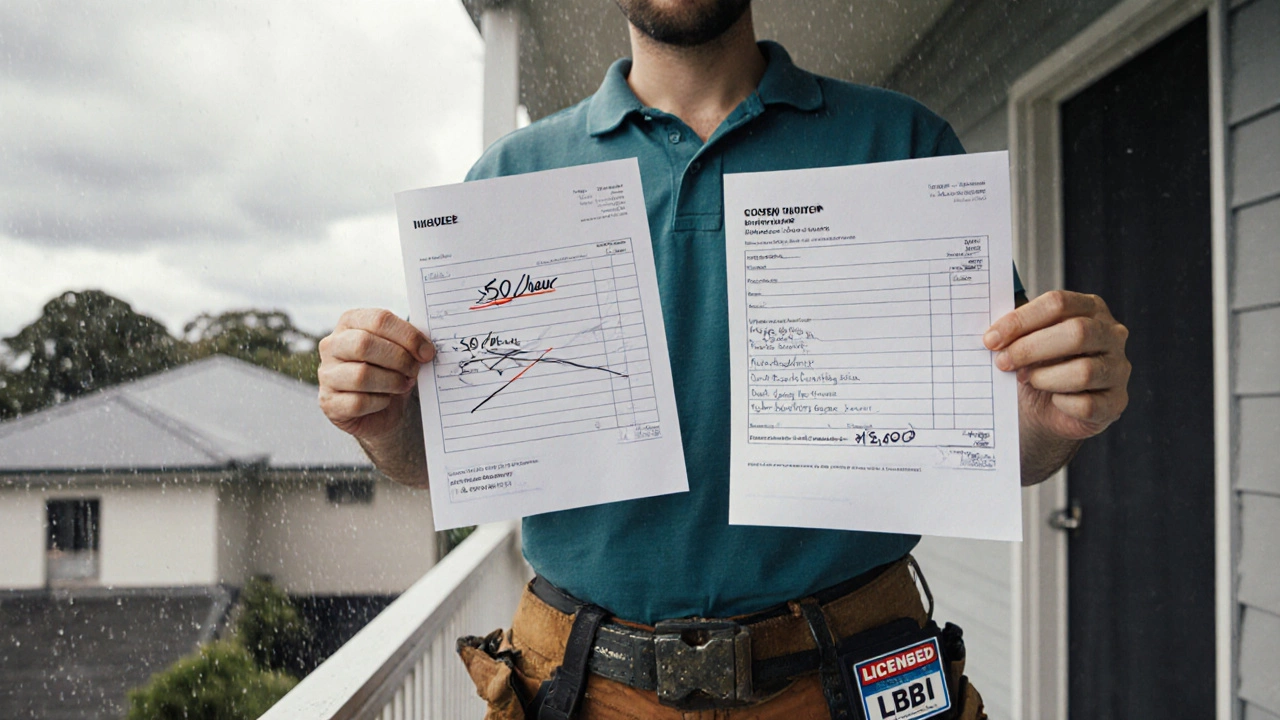How Much Do Roofing Companies Charge Per Hour in 2025?
 Nov, 18 2025
Nov, 18 2025
Roofing Cost Estimator
Calculate Your Roof Replacement Cost
Estimate your roof replacement costs based on New Zealand pricing. Remember, most roofing companies don't charge hourly rates but use flat pricing per square meter.
Estimated Cost
Based on your inputs:
Roof size: 0 m²
Material: -
Complexity: -
$0
This estimate includes labor, materials, disposal, and underlayment.
Actual costs may vary based on your location and specific job conditions.
Remember: Roofing companies typically charge per square meter, not hourly.
Roofing companies don’t usually charge by the hour. That’s the first thing you need to know. Most roofers in New Zealand, including those in Wellington, bill by the job-not the clock. If you hear someone quoting $50 an hour for roofing work, they’re either misinformed or trying to make the price sound lower than it really is.
Why Roofers Don’t Charge Hourly
Roofing isn’t like fixing a leaky faucet or painting a room. It’s messy, dangerous, and unpredictable. One day you’re tearing off old shingles; the next, you’re waiting for dry weather to install underlayment. Rain delays, damaged rafters, or hidden rot can turn a 2-day job into 5 days. Charging by the hour would mean the contractor eats the cost of delays, or you get stuck with a huge bill if things go sideways.
Instead, roofers use flat-rate pricing based on square meters, roof pitch, material type, and complexity. A simple gable roof on a standard house might cost $80-$120 per square meter installed. A steep, complex roof with multiple valleys and chimneys? That could jump to $150-$200 per square meter. Labor is baked into that price.
What You’re Actually Paying For
When you get a quote, you’re not just paying for someone to stand on a roof. You’re paying for:
- Removal and disposal of old materials (often $300-$800 extra)
- Underlayment and flashing (critical for waterproofing)
- Specialized tools and safety gear (harnesses, scaffolding, fall protection)
- Insurance and licensing (roofing contractors in NZ must carry public liability insurance)
- Waste hauling and landfill fees (recycling asphalt shingles isn’t free)
Most reputable companies include all this in one lump sum. A quote for a 120m² roof might come in at $18,000-$24,000, depending on materials. That’s not $50/hour-it’s $150-$200/m², covering everything from start to finish.
Hourly Rates Do Exist-But Rarely
There are exceptions. Small repair jobs might be billed hourly if they’re truly minor:
- Replacing 3-5 damaged shingles: $60-$90/hour
- Fixing a leaky flashing around a chimney: $70-$110/hour
- Clearing debris from gutters and roof valleys: $50-$80/hour
Even then, most roofers will give you a flat fee for these tasks. For example, replacing a small section of flashing might cost $350 flat, not $80/hour for 5 hours. You’re better off asking for a fixed price-even for small fixes.
Material Costs Change Everything
The type of roofing material makes the biggest difference in price. Here’s what you’re likely to pay for materials alone, per square meter:
| Material | Cost per m² | Typical Lifespan |
|---|---|---|
| Asphalt shingles | $25-$40 | 15-25 years |
| Colorsteel (steel roofing) | $45-$70 | 40-60 years |
| Concrete tiles | $60-$90 | 50+ years |
| Slate or clay tiles | $120-$200 | 80-100 years |
| Green roof (vegetated) | $150-$250 | 30-50 years |
Labour accounts for 40-60% of the total cost. So if you’re looking at a $20,000 roof job, roughly $8,000-$12,000 is labor. But again-you won’t see that broken down as hours. You’ll see it as part of the total.

How to Spot a Fair Quote
Here’s how to know if a quote is reasonable:
- It’s in writing, with itemized costs (removal, materials, labor, disposal)
- It includes the exact brand and model of materials being used
- It mentions warranty details (both for materials and workmanship)
- It doesn’t demand full payment upfront (50% deposit is standard)
- It matches the average range for your roof size and material choice
For a standard 100m² house in Wellington with Colorsteel roofing, expect $14,000-$18,000 total. Anything under $12,000? Ask why. Anything over $20,000? Make sure the materials justify it.
What Happens If You Choose the Cheapest Bid?
Lowballers often skip important steps:
- Skipping underlayment to save $1,000
- Using thin or recycled flashing
- Not replacing rotten decking
- Not getting a building consent
In New Zealand, roofing work over 10m² requires a building consent. Unlicensed contractors might offer $50/hour to avoid paperwork. But if your roof leaks in 2 years, you’re on the hook for the fix-and your insurance might not cover it if the work wasn’t permitted.
Always hire a licensed builder with a current LBP (Licensed Building Practitioner) status. You can check their license at lbp.govt.nz.
Seasonal Price Fluctuations
Roofing prices rise in spring and summer. That’s when demand spikes after winter damage. If you wait until March or April, you might pay 10-15% more. Winter (June-August) is slow, so you might get better availability and slightly lower rates-though weather delays are more likely.
Some companies offer off-season discounts to keep crews busy. Ask: “Do you have any winter specials?”

How to Get the Best Deal
Don’t just pick the lowest quote. Do this instead:
- Get at least three detailed quotes
- Compare materials-not just total price
- Ask about their process: Do they remove all old material? Do they inspect the decking? Do they install drip edges?
- Check reviews on Google and Trustpilot. Look for mentions of communication, cleanup, and timelines
- Ask if they use their own crew or subcontractors
One Wellington homeowner I spoke with saved $3,000 by switching from concrete tiles to Colorsteel-same lifespan, half the cost, and much lighter on the structure. She didn’t know tiles cost twice as much until she asked.
What About Insurance Claims?
If you’re filing an insurance claim for storm damage, your insurer might recommend a preferred contractor. That’s fine-but don’t feel pressured. You have the right to choose your own roofer. Make sure the quote you submit to the insurer includes:
- Itemized costs
- Photos of damage
- Repair plan
- Warranty details
Insurers pay based on replacement value, not your chosen brand. So if you want premium materials, you’ll pay the difference.
Final Thought: You’re Buying Peace of Mind
Your roof is your home’s first line of defense. It keeps out rain, wind, and cold. A bad roof leads to mold, rot, structural damage, and higher heating bills. Paying a bit more upfront for quality materials and proper installation saves you thousands later.
Forget hourly rates. Focus on total cost, material quality, warranty length, and contractor reputation. A $20,000 roof that lasts 50 years is cheaper than a $12,000 roof that needs replacing in 15.
Do roofing companies charge by the hour in New Zealand?
No, most roofing companies in New Zealand don’t charge by the hour. They use flat-rate pricing based on the size of the roof, materials used, and job complexity. Hourly rates are only seen for very small repairs, like replacing a few shingles or fixing a small section of flashing.
What’s the average cost to replace a roof in Wellington?
For a standard 100m² house with Colorsteel roofing, expect to pay between $14,000 and $18,000. This includes removal of old materials, new underlayment, flashing, labor, and disposal. Concrete tiles or slate can push costs to $20,000-$30,000.
Why are roofing quotes so different between companies?
Quotes vary because of material quality, labor practices, insurance coverage, and whether the company uses subcontractors. Some skip underlayment or disposal fees to offer lower prices. Always ask for itemized quotes and check for LBP licensing.
Can I save money by doing my own roof repair?
DIY roofing is risky and often illegal. In New Zealand, any roof work over 10m² requires a building consent, and only licensed builders can apply for one. Without proper training, you risk injury, water damage, or voiding your home insurance. The savings aren’t worth the risk.
How long does a roof replacement take?
A typical 100m² roof takes 2-4 days to replace, assuming good weather. Complex roofs with multiple levels, chimneys, or skylights can take up to a week. Weather delays are common in Wellington, so always ask how the contractor handles rain delays.
